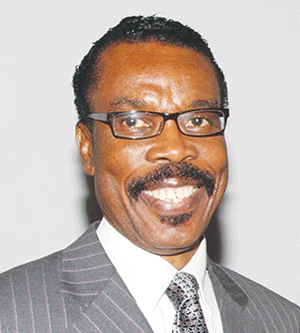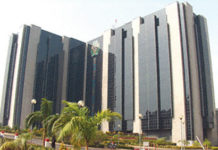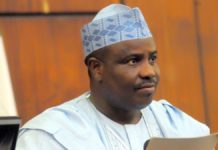Unrelenting inflationary pressure, low foreign exchange (forex) reserves, and about $1.5 billion of unmet dollar demand are exerting pressure for further devaluation of the naira for a third time in six months.

After JP Morgan threatened to remove Nigeria from its Emerging Market Bond Index (JP Morgan EM-BI) by the end of this year because of illiquidity of the currency market, analysts believe that new devaluation is inevitable unless measures are taken by the Central Bank of Nigeria (CBN).
Analysts at Financial Derivatives Company (FDC), led by the Chief Executive Officer, Bismark Rewane, said “the naira still has a long way to go to reach its possible fair value of N339 to the dollar.
“Thus, the CBN will have to react by using up more of the reserves to support the currency or allow the currency to depreciate further.”
They insisted that the relative stability in the inter-bank forex market is not sustainable.
In a report titled ‘Nigeria beyond May 29: Managing expectations,’ analysts at RenCap said the CBN is likely to move back towards a ‘managed float versus the managed peg’ of recent months, and a weaker naira implied a build-up of inflationary pressure.
“Post-inauguration, we think the naira – which has essentially been pegged at N199/$1 since the mid-February devaluation – will be devalued, to reflect the $4.5 billion fall in Foreign Exchange (FX) reserves since the February devaluation,” they warned.
“We see inflation breaching the Central Bank’s inflation target band of six to nine per cent and entering double digits in Q3 2015. This rules out any prospect of monetary easing in 2015, in our view.”
Ecobank noted in a recent report that naira short-term outlook is weak due to impact of sustained low oil prices, low forex reserves and huge backlog of dollar demand.
Despite 19 per cent year-on-year and -6.65 per cent year-to-date decline in value, financial market experts said the naira is still overvalued given the impact of low oil prices and drop in government’s forex earnings.
Worried by rising inflation, which was 9 per cent in April, up from 8.3 per cent at the beginning of the year, investors in the capital and fixed income markets are offloading portfolios with an eye on the United States, where the Federal Reserve plans to raise interest rates.
Report by Bloomberg said the CBN in conjunction with forex dealers is exploring ways to lift some of the policies that restrict demand and supply for dollar, as dealers believed that restrictions give the naira a false value.
FDC analysts argued that if forex trading restrictions are removed, the naira will depreciate and settle at its fair value put at N339 to a dollar.
Why naira is seen as overvalued
Industry sources insisted that the naira should be devalued because of huge demand for the dollar. They claimed that orders have been waiting for weeks and are yet to be met as restrictions have hampered supply, making it more difficult to appropriately price the naira.
Outstanding dollar demand is said to be between $1.5 billion and $2.5 billion and rising. If this demand is met, external reserves will reduce further, leaving the CBN with no other option but to devalue the naira.
Short dollar supply comes at a period when JPMorgan extended by six months its planned removal of Nigeria from its Bonds index on the basis of illiquidity of the currency market.
This implies that the global body has reservations in the ability of Nigeria to meet genuine dollar demands in the financial market.
JP Morgan reviewed its decision to exclude Nigerian bonds from its Emerging Market Bond Index (JP Morgan EM-BI) by extending the deadline to the end of 2015.
This extension is against the backdrop of allowing the new government more time to settle in and address the problems of liquidity, transparency and hurdles faced by investors in repatriating capital gains.
Ayodeji Ebo, Head of Investment Research at Afrinvest West Africa, expressed concern that Nigeria’s removal from the index would result in more capital outflows, stoked by a lack of investor confidence.
This, according to him, would further weigh down external participation in the bond market as foreign investors already consider the Nigerian market a high risk waiting to crystalise.
Fiscal challenges since the crude oil price crash has left governments at all levels with no choice but owe staff salaries. For a government that basically relies on oil earnings, further devaluation of the naira may boost government revenue but with diminished value.
Even as salary arrears of public workers have piled up for months, the country has already borrowed half of its budgeted borrowings and spent it on paying salaries and funding other recurrent expenditures.
The naira was devalued December last year, and was further devalued this February when the CBN adjusted the peg upwards.
However, the naira has recorded gain over major currencies traded in the market since the new government was inaugurated on My 29.
President of the Association of Bureau de Change Operators of Nigeria (ABCON), Aminu Gwadabe, confirmed on Monday, June 15 that the naira gained N22 over the dollar, from N228/$ to N206/$, but pound sterling lost value against the naira, from an all-time high N345/£ to N329/£.
But FDC analysts warned that the relative naira stability and gain in the inter-bank forex market cannot be sustained as it is not driven by any positive economic factor.













